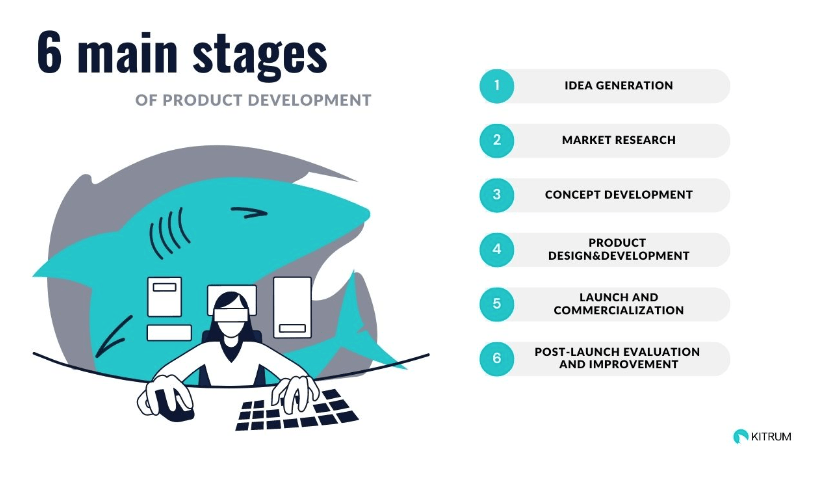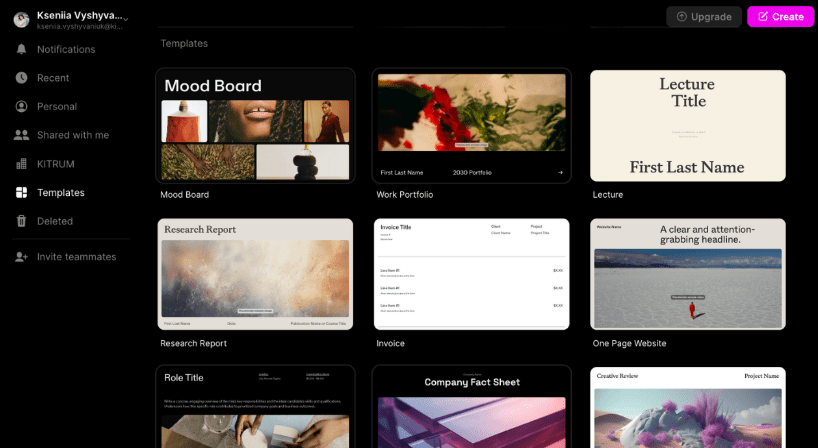Discover how cutting-edge AI tools can significantly reduce the time required for market research, analyze vast amounts of data, and provide invaluable support throughout various stages of the product development process.
Imagine your company is conducting market research for a new product. In the past, market research would often be a time-consuming process that could take months to complete. However, the time required for market research has been significantly reduced by integrating AI-powered market research tools.
What used to take months can now be accomplished in a matter of days or even hours. AI tools can analyze vast amounts of data, such as consumer insights, market trends, and competitor analysis, in a fraction of the time it would take manually.
So, how can AI accelerate the product development process? Let's delve deeper into the stages of product development and explore how AI tools can specifically assist at each stage. From idea generation, where AI can provide trend analysis and idea exploration, to launching a product, where AI can optimize marketing campaigns, personalize customer targeting, and analyze market data for effective product positioning and launch strategies.
Explore development companies on Visual Objects.
What are the 6 Main Stages of Product Development?
Product development is a complex and iterative process that spans multiple stages, from idea generation to post-launch evaluation and improvement. Each stage plays a crucial role in transforming an idea into a tangible product that meets customer needs and creates value in the market.

Idea Generation
Сompanies brainstorm and gather inspiration to generate innovative concepts for new products or services. It involves exploring market trends, customer feedback, and emerging technologies to spark ideas.
Market Research
Сompanies gather information about customers, competitors, and market trends. It helps understand customer needs, analyze competition, and stay informed about the market environment.
Concept Development
Companies refine and shape their initial product ideas in the concept development stage. They define key features and specifications based on customer needs and market insights.
Product Design & Development
The product design and development stage involves designing and manufacturing the product, with the invaluable input of a UI/UX designer role in the product development process. Feedback from potential customers determines the next steps, considering functionality and user experience. Based on the outcomes of market testing, the business owner evaluates the readiness for large-scale production.
Launch & Commercialization
The product is officially introduced to the market during the launch and commercialization stage, marking a significant milestone in the product development process. Companies allocate resources to create impactful marketing campaigns that communicate the product's value proposition to the target audience.
Post-Launch Evaluation & Improvement
After the product launch, companies collect feedback, monitor sales, and evaluate customer satisfaction to identify areas for improvement.
How Can AI Help in Leveraging Product Development?
AI tools can streamline various stages of product development, from rapid prototyping to automated feedback, saving time and improving overall outcomes. According to Statista, as of 2022, 23% of companies have adopted AI in their product development processes. But this number is expected to even double by 2025, highlighting the growing importance of AI in driving innovation and efficiency.
So, how exactly can AI help in leveraging product development? Let's look at some stages of product development and see real-world examples of using AI:
Idea Generation with AI
At the idea generation stage, AI-powered applications like Tome, Ideanote, and Chat GPT simplify the process and provide a wealth of ideas.
Tome
Tome is an AI-powered storytelling tool available on both its website and iOS app. It provides a seamless drag-and-drop interface for creating professional-grade presentations.

With its advanced AI technology, Tome can generate visually engaging and interactive stories incorporating various content types such as live embeds, prototypes, and 3D renderings. Once a story is created, it can be easily shared with teams or audiences on the web with a single click. The convenience of editing on the go is also offered through the Tome AI iOS app.
Ideanote
Ideanote provides a platform to input your business or project details and swiftly generate ideas tailored to your needs. You have the flexibility to adjust settings and customize the creativity and topic of the output. Choose from various options like cost-saving, customer satisfaction, or new product ideas.
To ensure security, Ideanote employed SSL encryption to safeguard your ideas. Besides, this tool stores your ideas locally in your browser, and if you export them to the platform, they are encrypted during transmission and storage. This online tool serves as an excellent starting point for brainstorming, enabling you to consider alternative perspectives that may spark new inspiration.
Chat GPT
Chat GPT-3, powered by OpenAI, offers valuable support in the idea generation stage of the product development process. Engaging in a conversation with Chat GPT-3 can provide creative prompts and assist in brainstorming sessions.
Its natural language processing capabilities allow it to understand and respond to user inputs, facilitating the exploration of diverse ideas and contributing to generating innovative concepts.
Chat GPT-3 serves as a virtual collaborator, helping to overcome creative blocks, inspire new perspectives, and augment human ideation efforts.
Leveraging the capabilities of Chat GPT-3 can lead to the discovery of unique and groundbreaking ideas, driving the product development process forward.
Market Research & Concept Development with AI
With AI-powered tools, companies can analyze vast amounts of data, including market trends, consumer insights, and competitor analysis, to gain valuable insights and make informed decisions.
NewtonX
NewtonX uses artificial intelligence to provide market research and expert sourcing services. NewtonX transforms business questions into advanced queries across 40 search fields, accounting for factors like geography, product knowledge, and seniority level. Then they combine multiple fields to reach your target audience accurately.
They use their API to scan professional networks and generate tailored query results. With a curated list of professionals, they ensure maximum reach without compromising specificity. Their advanced search technology delivers precise and tailored results for informed decision-making.
Major industry giants like Microsoft, Meta, Pinterest, Amazon, and Stripe have chosen this platform.
Remesh
Remesh revolutionizes market research with its AI-powered tool that facilitates real-time conversations between businesses and their customers or stakeholders. Leveraging natural language processing (NLP) and OpenAI's GPT language models, Remesh analyzes customer feedback to deliver instant insights and recommendations.
The platform's conversational AI capabilities enable businesses to engage with large groups of participants simultaneously, making it a cost-effective and scalable solution for gathering valuable insights and feedback. Among its customers are Nestle, Mercer, and Barclays.
Pollfish
Pollfish is a leading DIY market research provider with a mobile-first approach. With access to over 250 million real consumers worldwide, they offer real-time responses and a broad distribution network for precise targeting. Their range of market research options, including A/B testing and advanced questionnaire logic, ensures timely insights. With rigorous quality checks, Pollfish guarantees high-quality data aligned with your targeting criteria.
Product Design & Development
AI can significantly contribute to product development, as demonstrated by leading companies in various industries. For example, Pfizer, a prominent pharmaceutical company, harnesses artificial intelligence to streamline drug discovery.
Through their AI-powered platform, "Atomwise," Pfizer uses deep learning to analyze extensive datasets of potential drug compounds, identifying promising candidates for further evaluation. This innovative approach has revolutionized the speed and cost-effectiveness of developing new drugs, advancing medical research.
Likewise, Adobe leverages AI technology in its content creation efforts. With their AI-enabled platform, "Adobe Sensei," they employ machine learning algorithms to analyze images, videos, and other content types, providing intelligent suggestions for improvements. This enables Adobe to continuously enhance its Creative Cloud products and the productivity of content creators.
These examples highlight the transformative impact of AI in product development, empowering companies to innovate, optimize processes, and deliver exceptional products and experiences.
Let's examine a few examples of AI tools that can accelerate product design and development.
CoPilot
CoPilot is an AI tool developed by GitHub that leverages the power of OpenAI's Codex language model to provide intelligent code suggestions and auto-completion capabilities. It is designed to assist developers during the product development process by improving coding efficiency and productivity.
CoPilot can be immensely helpful in product development as it offers intelligent code completion across multiple programming languages. By analyzing the context and understanding the code being written, CoPilot suggests code snippets, functions, and even entire blocks of code, saving developers time and effort.
With CoPilot, developers can quickly generate code for common tasks, explore different implementation approaches, and benefit from its extensive knowledge base derived from billions of lines of publicly available open-source code.
Launch & Commercialization with AI
Launching a product with AI can significantly benefit marketers in various aspects. Tools like Chat GPT or Jasper chat offer valuable assistance in generating content, allowing marketers to quickly create compelling messaging and promotional materials.
AI can also optimize email campaigns by analyzing customer data and behavior and tailoring content to specific audiences for improved engagement and conversion rates.
Furthermore, AI-powered tool like Botsonic chatbot builder enables anyone to create custom chatbots without any technical skills. With its NLP-based approach and the power of GPT-4, Botsonic serves as a dynamic platform for customer interactions. It acts as a single source of truth, providing personalized responses and enhancing the user experience.
Businesses can quickly implement their own custom ChatGPT bot on their website without the need for complex coding. Botsonic helps businesses keep up with customer needs and improve engagement effortlessly.

Lastly, AI can analyze customer feedback at scale, providing valuable insights into customer preferences, sentiment, and areas for improvement. By leveraging AI in the product launch, marketers can enhance their strategies, optimize campaign performance, and better understand and engage with their target audience.
AI's Impact on Product Development Processes
AI definitely plays a significant role in improving product development processes by providing valuable insights, streamlining tasks, and improving decision-making. It offers remarkable capabilities in idea generation, market research, content creation, predictive analytics, and customer feedback analysis.
However, it's important to note that while AI can greatly assist in these areas, it cannot replace the inherent value of human involvement in the product development cycle. AI tools should be seen as powerful aids that complement human creativity, expertise, and intuition.
The human touch remains crucial in interpreting AI-generated insights, making strategic decisions, and ensuring that products meet the nuanced needs of customers. A balanced approach combining AI's and human capabilities' strengths ultimately leads to the most successful and impactful product development outcomes.
Additional Reading: